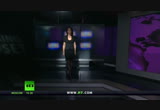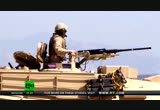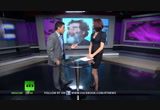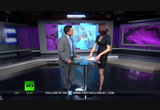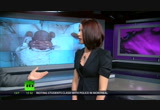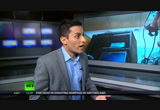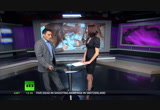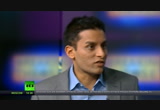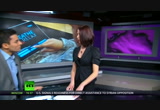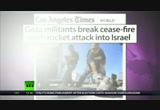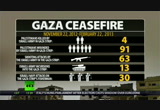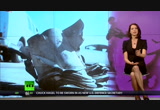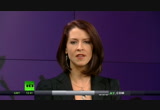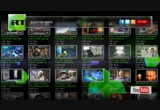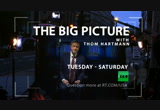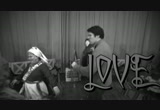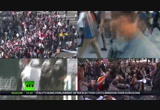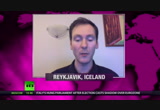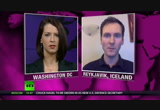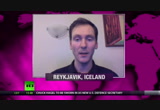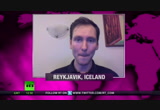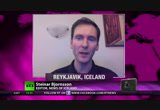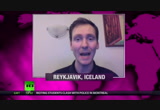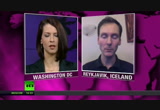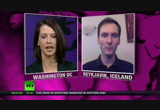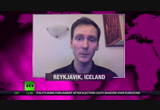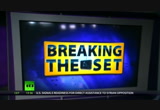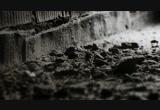tv Breaking the Set RT February 27, 2013 7:28am-8:00am EST
7:28 am
three bucks a month for food i should try it because you know how fabulous i had lunch i got so many i mean hammered and i believe that i'm. really messed up. in the old story so personally. the. worst are going to go right out to the. radio guy and for a minute. i want. to give you never seen anything like this until. i am having martin and this is breaking the set so thinks the supreme court the government was just reissued a free pass to spy on us anytime anyplace that's right today the top justice is set up the court will not hear a case brought by
7:29 am
a group of lawyers journalists and organizations who have contested a provision of the foreign intelligence surveillance act or files that that lets the n.s.a. silently monitor people's emails and phone calls and you want to know what the saddest part of all of this is the court wasn't even considering pfizer's constitutionality they were merely determining whether lawyers should be able to file a lawsuit to challenge it in the first place and the court said no no to challenging the system no to privacy and no to the civil liberties are supposed to uniquely characterize this country i don't know about you but i'm tired of being told no when it comes to my freedoms so let's go break the sets. next month will mark the ten year anniversary of the invasion of iraq the day for which many will remember the one million plus lives that were lost along with the tens of thousands who were injured and displaced and it's
7:30 am
a reality that is forever changed my next guest who spent fifteen months in iraq as a combat medic one of the longest combat deployments by a physician since world war two he provided frontline emergency care during the peak of the baghdad insurgency to thousands of wounded soldiers and iraqi civilians but perhaps he's most notorious for being in the spotlight right here the video of the first medical examination of saddam hussein after his capture so to talk about his experience of brought along with dealing with the health effects felt by soldiers at home i asked dr suzy bose about his feelings on his most infamous example. to take care of saddam hussein shortly after he was captured and. you know looking back at it i think the most important thing i glean from that is you have to do your mission you have to do your job you know you're trained in the military to do your mission and you may have feelings one way or the other and even
7:31 am
in our everyday jobs out there we may feel strongly for against our mission but we have to do our mission and for me it was just taking care of a patient you know just another person but looking back on it now are you kind of like whoa i think you realize the weight of the moment when it's done but you know you reflect on it and you just think you know what can we take from this and i think what we can take from this is focus on your mission and do your job and maybe in unexpected ways but you have to do your job and do it well. and you were part of one of the longest combat deployments i mean fifteen months you were on the battle lines front lines of iraq why are you there for so long and how do you deal with this with your own post-traumatic stress disorder being on the battlefield i think . you know i'm very thankful to have the opportunity to be out there and help the soldiers help the injured iraqis when they needed medical care so it was an honor to serve. you know if you look statistically at the rand studies for example out of
7:32 am
every four soldiers that go out there maybe about one out of four come back with p.t.s.d. so the majority do not although everybody probably goes through some form of combat stress most do not go through p.t.s.d. so for me it was just staying focused and trying to do your job and trying to provide the best care possible. let's talk about p.t.s.d. it's something that's affecting a lot of soldiers obviously you have returned do you think that the v.a. is doing a good enough job identifying p.t.s.d. i know you said one out of four soldiers but i mean i feel like a lot of soldiers want to expedite their return to home and maybe skip really you know that they have these problems. you know i as you know it's close friends in iraq war right now are in the past. you know let's look back and step back a bit and take an optimistic view on this. you know we all look at p.t.s.d. and we think negatively look at these things that are happening because of p.t.s.d.
7:33 am
i kind of look at it in a positive way let's look at the evolution of warfare and in the civil war for example from a minor wound you would receive antibiotics and you die from that so because of world war two when they discovered penicillin. all of a sudden there's advancements in medicine and more people are surviving. in the korean war if you're an amputee you're pretty much going to die it was a death sentence it's a given but now many of these soldiers are coming back and they're surviving the battlefield so what we're dealing with now are more patients with p.t.s.d. and i look at that optimistically because these are patients that would not be surviving in prior wars and now they're surviving so i think as. war evolves as medicine evolves we're going to learn more and more about it and i think the v.a. is trying to do an excellent job identifying these cases and all those go on are going to learn all on once again talk about the evolution of war first of all we're
7:34 am
fighting a nonexistent enemy we're fighting a tactic so if you look at the evolution of war from the korean war world war two those are actually legitimate threats that you could argue that soldiers actually knew they're going fighting and putting their lives on the line to kill and die for something that was tangible now we're fighting a perpetual idea how i mean soldiers it's hard to even deal with that in itself yes you could argue that we have less amputees less things you could say with penicillin etc but he has p.t.s.d. is completely debilitating i mean i know some people who can't even function they can't even work mentally they can't even comprehend why they went and saw people die in iraq a million dead based on why it's i mean how do you reconcile that you know i mean the nature of warfare has changed i mean before bows and arrows spears force on force now it's often urban warfare and it's not always force on force you know attack you know where you go for some force that you're in the middle of
7:35 am
a city you know i remember getting shot out of buildings you're going under bridges people are throwing grenades at you it's a whole different environment right now and as you relate it back to p.t.s.d. p.t.s.d. it's basically you know the main concept here is mental stress so whether it's old warfare or warfare today you know leave it up to our military officials and our elected officials to determine you know what we're going to war for but as a medical professional i think the concept is the same it's mental stress and how to deal with that it's just hard to look at something so horrifying in a positive light and be optimistic about especially when i know people who are completely debilitated they go to the v.a. they leave with a bag of pills they wait for hours it's a horrible situation i remember reading back in two thousand and nine of. about a secret courting that revealed the. army was actually pushing its medical staff not to diagnose p.t.s.d. an effort to save money and get them promoted i mean do you think that this is an isolated incident here you know i think this i again i'm looking positively at this
7:36 am
i understand what you're saying it's devastating and you know the patients are suffering but i'm looking at this from a medical perspective that they made it back here alive and you know what just like we figured out how to treat that infection in the civil war just how we figured out how to transfuse blood in world war one you know we're going to figure this out and really what are the military suicides how can we have it figured out that's exponentially growing by the year record numbers of suicides by vets i mean you know they're coming back alive but at what cost i know i mean right now what is it like one out of every hour every hour and i think one out of every twenty three or twenty three a day or something like that it's a it's so sad that you know you survived the battle zone you survived an improvised explosive devices and come back and why is that i don't know i haven't and growing i think of medical perspective i think you know the concept here is that even without a physical wound on your body without a single abrasion a single scratch you can have invisible wounds you can have mental operations and
7:37 am
these are serious injuries and we are recognizing this now thankfully because you know in my opinion i think in the vietnam war when patients came back it wasn't as much of a recognized entity and those veterans struggled as well and you look statistically at it now you know after nine eleven there's been about a fifty seven fifty eight percent increase in p.t.s.d. claims in vietnam veterans today so we're recognizing it more than we know what's in it to these patients are surviving so now today's challenge on the date of today's conversation is overcoming the suicide rate overcoming the challenges. allocating the resources properly these are things that we have to deal with it will certainly not have been wars based on false pretenses and profit would be the first thing to get veterans back. and they're mentally stable position and fighting for the right reasons thank you so much for coming on sharing your opinions thank you i mean i think. as war evolves one day hopefully there will be no more of that
7:38 am
just try to take the best actions the best we can thank you so much for your time appreciate it. i. so i woke up this morning the first thing i read was that gaza had broken the cease fire with israel since the last armed conflict broke out this past november check out just a few of the headlines i saw regarding the attack c.b.s. news writes that gaza militants fired rockets into israel i'm sorry one rocket in israel police say and the l a times reiterate the same gaza militants break cease fire with rocket attack into israel and a.b.c. news is close behind but first to gaza rocket in three months rattles cease fire. all right well it is a fact that gaza fired their first rocket since the ceasefire this segment called weapons of mass distraction for nothing the corporate press is so quick to pounce
7:39 am
on a rocket attack against israel but where were they during the dozens of instances in the last three months where israel has been in violation of the cease fire incidents we would never hear about from the corporate media just check out this chart all of israel's violations information is on the record from the un's office for the coronation of humanitarian affairs what it shows is the number of recorded instances of israeli attacks against palestinians since the ceasefire take a look for deaths ninety one injuries sixty three instances of shootings along the border and thirty attacks against palestinian. fisherman you see according to the same records before the rockets fired against israel which thankfully resulted in no injuries or loss of life there had only been two instances of palestinian retaliation since the cease fire which also resulted in no
7:40 am
casualties. that changes the story a little bit doesn't it. but i guess that's the warped aloft portion ality when it comes to the issues involving israel and palestine a matter how many violations of international law are committed by israel it's all swept under the rug until the tiny strip of land living under their brutal military occupation strikes back and then all hell breaks loose now another thing you won't hear about this about this attack is the actual context behind it as it turns out the gaza rocket was launched in direct response to the death of a palestinian prisoner who died in an israeli prison although israeli officials claim that the prisoner died from cardiac arrest an autopsy has revealed that he was actually beaten to death but unfortunately he's one of the thousands there are countless other palestinians unjustly being held in israeli prisons for the crime
7:41 am
of simply crossing into israeli occupied territory one such man. there is nearly on his deathbed suffering from a hunger strike that he's been on for two hundred days to protest his detainment his treatment along with that of other prisoners has sparked almost daily protests that have heightened tensions between israel and palestine for weeks of course all of this is information you won't hear from the corporate press the same news media that chooses the establishment line over the right line which chooses to protect israel when it should be condemning israel and it's a shame really because the media's complicity means the deafening silence of human rights that can't afford. big nor any longer. look like we see head to our youtube channel at youtube dot com so i bring in the set and be sure to subscribe so you don't miss a single episode we do of all of our interview segments if you want to catch up
7:42 am
with those separately encourage everyone to check out our interview with mike dolan on the trans-pacific partnership with a t p p from last week you know also look at every segment we've done separately under our have a section on the top of the page big brother watch to weapons of mass destruction check out all of that and more at youtube dot com breaking the set and right now you take a break from my preaching but stay tuned to hear about the peaceful revolution that overthrow a government that the mainstream media just happened to get to fill you in on that . more news today violence is once again flared up. these are the images the world has been seeing from the streets of canada. trying to corporations rule the day.
7:43 am
old. technology innovations all the latest developments from around russia we. covered. you know sometimes you see a story and it seems so you think you understand it and then you glimpse something else and you hear or see some other part of it and realize everything you thought you knew you don't know i'm tom harpur welcome to the big picture.
7:44 am
7:45 am
i mean there at least. a little bit more of the churches or anything like that to. cut. over the last few years the corporate media has extensively although superficially covered violent riots revolutions uprisings crackdowns on the scent occurring all over the world from the ongoing protests in greece and spain to the arab spring which gave rise to uprisings in tunisia libya egypt the hurricane and syria among others with a lot about the changes occurring in these countries one revolution has gone almost entirely unnoticed peaceful rebellion that led to the resignation of a government and redrafting of a constitution all in the midst of one of the most devastating financial crises in
7:46 am
modern history since two thousand and eight the sub arctic nation of iceland has been rising above the ashes of total financial. collapse but the peaceful revolution that has led to an innovative new government so to discuss the steps iceland has taken to quietly reshape its financial infrastructure and system of governance there nonviolent dissent early i spoke to stayner bush an editor and economist of news of iceland i first asked him the steps the citizens of iceland took in the wake of the financial meltdown. three months of protesting the government went resigned and the new government was formed and parliamentary elections were held with a center left government and they removed the boards from the central bank and from the financial. authorities. a good bit of for example the central the governor of the central bank he refused to resign so he the
7:47 am
government the new government had to. change the laws about the central bank so they could remove him and appoint the new governor of the central bank and then. a report. was written by specialists. economists and others who went through all the details of the crisis and they prosecuted those responsible. yes so let's go through a couple of these steps really quickly so when we say large protests and for the part that how many people are we talking about here. the biggest the biggest was six thousand people i believe ok and how much or how many people does iceland have . three hundred twenty thousand people so it's a pretty big number comparative really let's look at the prosecuting the bankers that i mean you know how was it that ice and was able to prosecute big banks i mean were iceland banks had to be in the first place not too big to fail was there more
7:48 am
gov regulation in place at the time that prevented that like it did in the u.s. . the icelandic banks were way too big to be saved the balance sheet of spending banks was ten times g.d.p. so the government really did not have a choice they did not have the foreign reserves to save the banks and they just they just let the banks default because simply they just couldn't save them and they were nationalized correct. yes the first bank was nationalized the there were three large banks the first one was nationalised. but that sent the signal that the financial sector in iceland was in a big trouble and led to a total collapse of three banks and you know coming from a country that really we see the state crushing dissent i mean the occupy wall street movement absolutely crushed it just seems like we don't ever hear about
7:49 am
peaceful resistance actually making a change and and having it be a tangible change how do how was it that people rose up peacefully and forced the government to resign in such a short period of time. yes it's quite amazing but. i don't know what to say that there were. they protested daily and weekly. for months they threw acts of parliament and the police had to put up barriers around the parliament and they just continue doing this giving speeches outside the parliament every day and. the government just decided to listen to the people while the government actually decided to listen to the will of the people hear that and that is amazing oh my god that incredible let's talk about the constitution that was formed or is and still in the process of being formed how did it come to be what was the process of electing the people to write this new constitution. well
7:50 am
right after the new center left government took office in two thousand and nine they they decided that the constitution we needed a new constitution they thought that the constitution did it and we mostly go a constitution from denmark and it is quite hopefully in some parts but it's good in many parts and they basic that well a new constitution which could have been. better just for the democracy to to prevent it they just wanted to do it to prevent this from happening again so iceland i guess you could say i mean it's inching toward direct democracy is the closest thing you can really get toward direct democracy. but i mean it's happening transparently as i've read but i mean are there any safeguards to prevent corruption hijacking the new constitution and really preventing this transparent
7:51 am
direct democracy from happening. well. because it usually committee has finished making a draft for the cops constitution and. no the draft this at the parliament in the parliament is it going no technical details they're changing it to so that it more so it be legal terms are more correct and they're also. they also change teams some chapters and doing a lot of modifications and it's very unclear if they will be able to get the new constitution through before the parliamentary elections are held in two months so. but it's some say it's not good that the parliament can just change the draft from the committee. so we will have to see what happens in the next two months if well if they do change it i don't doubt that there will be resistance from the people i again and hopefully prevent that from happening you know the country also
7:52 am
has been a warning some of the world's strongest freedom of information laws protections for journalists in fact the f.b.i. was just kicked out of the country for trying to investigate wiki leaks their talk about this and talk about these new laws to protect journalists. the minister of the interior felt that the f.b.i. was in iceland on false pretense that f.b.i. had said that they wanted to investigate a computer attack on the government offices but when they go to iceland they were what they really were doing worse in with it investigating wiki leaks and interrogating an icelandic hafter related to weaken leaks and the minister of interior said that he did not know about this and. he wanted and that he actually said that this what the f.b.i. was doing was illegal and so he asked them to leave and they did you know they have
7:53 am
and i go as no stranger to really a cross in their you know the government overreach and in different countries i think it is and have to be one reason i say. no i was just about to say about the legislation about in the new information law. i don't know the. details but. it protects. and sources and information. so the most obvious question of all as we're going through these things when we hear about unrest revolts violent revolt all the around the world constant barrage of this on on the mainstream media why is it that iceland's peaceful revolution is completely censored or. is it censored absolutely we haven't heard one thing you can barely even find information when you do a google search on this i'm not even kidding. you know that's amazing i don't know
7:54 am
i don't know how it is censored or how they can be put. yeah i don't know what to say so maybe people are very interested in peaceful revolution as they only want to hear about the oaklands or maybe it's really they're scared of people picking up the cue from iceland and really moving forward and saying that this is feasible this is possible to have a nonviolent revolution and overthrow the government and nonviolent means that could be a possibility of course the corporate media has the same vested interests that the government does you can call them almost a propaganda arm of the establishment but let's talk about capitalism because i think you know what led to this collapse in iceland is representative of kind of the systemic failure of contemporary modern capitalism this predatory capitalism that allows these huge too big to fail banks of course yours were too big to save do you think iceland is moving into a new innovative economic system integrating aspects of capitalism or they simply leaving this model behind what is what is the economic model that you guys are
7:55 am
moving forward with. so the center left government to go fish in two thousand and nine. nordic nordic economic model. which puts a lot of restrictions on the banks and puts on a lot of regulation and supervision but. but before the elections are coming up now in two months and we will have to see the party that was in power in for eighteen years before the financial crisis in two thousand and eight they they are getting a lot of support again so it's very interesting to see how much support they will actually get into months and it might be quite substantial while hopefully other countries can adopt aspects of what aizen has done completely amazing totally censored from a western world at least in this country thank you so much for coming on shedding some light on this crucial subject will definitely be following the elections as
7:56 am
they come up steiner really appreciate your time economist and editor of news of iceland thank you. what a thought a government that actually listens to its people i think we should take heed from iceland learn from their success and apply it to our own broken system here so one of the we haven't heard much about a country that the entirely peaceful means successfully ousted their corrupt government a government that feared not satisfy the demands of the people so if there is a lesson learned at that and now is the time we stop fearing the government i think it's time that the government starts fearing us. wealthy british style. that's my time to explain the things.
7:57 am
22 Views
Uploaded by TV Archive on

 Live Music Archive
Live Music Archive Librivox Free Audio
Librivox Free Audio Metropolitan Museum
Metropolitan Museum Cleveland Museum of Art
Cleveland Museum of Art Internet Arcade
Internet Arcade Console Living Room
Console Living Room Books to Borrow
Books to Borrow Open Library
Open Library TV News
TV News Understanding 9/11
Understanding 9/11
